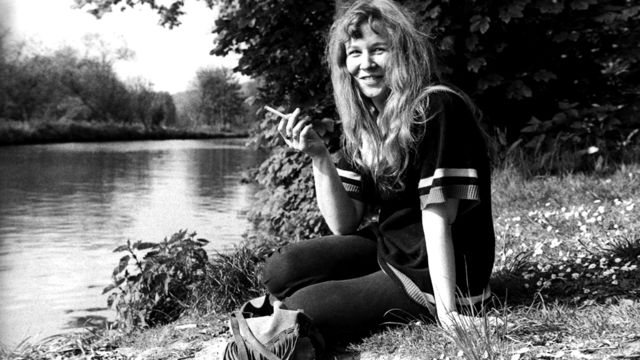Thea Gilmore, Cecil Sharpe House | reviews, news & interviews
Thea Gilmore, Cecil Sharpe House
Thea Gilmore, Cecil Sharpe House
English folk singer takes on Sandy Denny's legacy

Who knows where the time goes? Even semi-detached folk fans like me know that immortal Sandy Denny song with that title. The passage of time and passing of the seasons were great subjects for her. As some French dude put it: Ou sont les neiges d’antan?
This year’s snow was coming down in Siberian clumps but that didn’t stop an enthusiastic crowd turning up for a special event – a live version of a remarkable project; singer-songwriter Thea Gilmore’s setting to music of an album’s worth of Sandy Denny lyrics, found in her notebooks after she died.
It’s 30 odd years since Denny's death, after bashing her head, falling down the stairs, and battling cocaine and alcohol problems, with a husband who had left and taken their baby daughter with him. She died aged 32, more or less the same age as Thea Gilmore is now, who was born a year after she died.
 Several people in the audience had seen Denny perform and some even knew her. The venue, Cecil Sharpe House, had a resonance for Denny (pictured left in pastoral mode) fans as it was where she did a breakthrough concert early in her career for the BBC. Before she came on, the sound system played some Nick Drake, a fellow Island artist and fellow tragedy, two of the greatest British songwriters of the Seventies. (Who else? Bowie? Ferry? Bee Gees? Glen Matlock? Gary Glitter? Did any of them have the craft and poetry of those two?)
Several people in the audience had seen Denny perform and some even knew her. The venue, Cecil Sharpe House, had a resonance for Denny (pictured left in pastoral mode) fans as it was where she did a breakthrough concert early in her career for the BBC. Before she came on, the sound system played some Nick Drake, a fellow Island artist and fellow tragedy, two of the greatest British songwriters of the Seventies. (Who else? Bowie? Ferry? Bee Gees? Glen Matlock? Gary Glitter? Did any of them have the craft and poetry of those two?)
Gilmore set the scene by playing a few of her own songs. I preferred the simpler, affecting ballads like “Old Soul”, written to her unborn child when heavily pregnant, and “How the Love Gets in”. Her voice can be as pure as the snow, but with just the right amount of dirt as well. Her rockier numbers like “Mainstream”, with Costello-ish clever or political lyrics, either didn’t work with an acoustic band or perhaps just didn’t work in the atmosphere of what was a tribute to a much-missed artist.
Perhaps they didn’t want to be too dragged down into the ethos of folk-central at Cecil Sharpe House (there were adverts for the likes of Mr Gubbins’ Bicycle and Steamchicken!, doubtless top notch performers). The new/old Denny songs were arranged with great panache (kudos to co-arrangers, Gilmore’s husband, guitarist Nigel Stonier and cellist Liz Hanks, who put a hired string section impressively through their paces).
The title song, “Don’t Stop Singing”, was a stand-out. Like many of the best songs, the undertow of melancholy in the verse was undercut by the positivity of the chorus, and vice versa - a perfect recessionary song that could become a modern anthem. As the title track of the album and one they played twice, the band clearly realised the power of the song.
The last three songs had been difficult to write, and seemed to be powerful reflections of Denny’s state of mind in the months before she died
Why they or their record company have decided to release a much weaker song on the album, “London”, as a single is mystifying, even if it is “catchy”. It’s a thin lyric about missing home with a backing track that sounds like it’s trying too hard. Maybe it will grow on me.
Nearly all the other songs worked very well, though, the music enhancing the spirit of Denny's lyrics, and ending up an alchemical mix of both artists, notably on the wistful “Glistening Bay”.
The last three songs Gilmore admitted had been difficult to write the music for, and seemed to be powerful reflections of Denny’s state of mind in the months before she died. I found myself thinking of the last journal of Sylvia Plath, destroyed by Ted Hughes to protect the children. “Long Time Gone” had Denny writing “I’m in such a terrible state, and my city’s just like me/ I can’t afford to live in this place and I can’t afford to leave.” "Song No 4" had “If I don’t make it before I die, I just ain’t gonna die.” The final track “Georgia” was to her “precious child”, hoping that she sleeps soundly. At the time she wrote this, it's likely Georgia was half way round the world.
“You’re quiet,” said Gilmore. Not surprising, as it was beyond poignant, even harrowing at times, to listen to this stuff. What Georgia herself, now in Australia with her own children, makes of this, a lullaby from a mother she will never know, God knows.
Gilmore tried, not entirely successfully, to lighten the mood with the encores, including a Denny classic “Old-Fashioned Waltz”. The audience might have preferred “Who Knows Where the Time Goes?" but that perhaps would have been too obvious and, as the likes of Kate Rusby and Judy Collins have shown, you mess with the original at your peril. Then we went off into the winter wonderland of North London. Sandy Denny would have loved the evening, you hope. It was hard not to imagine her hovering above, probably cackling with laughter and swearing like a trouper as she usually was, until the demons got to her.
Watch Thea Gilmore on The Andrew Marr Show
rating
Explore topics
Share this article
The future of Arts Journalism
You can stop theartsdesk.com closing!
We urgently need financing to survive. Our fundraising drive has thus far raised £49,000 but we need to reach £100,000 or we will be forced to close. Please contribute here: https://gofund.me/c3f6033d
And if you can forward this information to anyone who might assist, we’d be grateful.

Subscribe to theartsdesk.com
Thank you for continuing to read our work on theartsdesk.com. For unlimited access to every article in its entirety, including our archive of more than 15,000 pieces, we're asking for £5 per month or £40 per year. We feel it's a very good deal, and hope you do too.
To take a subscription now simply click here.
And if you're looking for that extra gift for a friend or family member, why not treat them to a theartsdesk.com gift subscription?
more New music
 Lady Gaga, The Mayhem Ball, O2 review - epic, eye-boggling and full of spirit
One of the year's most anticipated tours lives up to the hype
Lady Gaga, The Mayhem Ball, O2 review - epic, eye-boggling and full of spirit
One of the year's most anticipated tours lives up to the hype
 Slovenian avant-folk outfit Širom’s 'In the Wind of Night, Hard-Fallen Incantations Whisper' opens the door to inner space
Unconventional folk-based music which sounds like nothing else
Slovenian avant-folk outfit Širom’s 'In the Wind of Night, Hard-Fallen Incantations Whisper' opens the door to inner space
Unconventional folk-based music which sounds like nothing else
 'The Art of Loving': Olivia Dean's vulnerable and intimate second album
Neo soul Londoner's new release outgrows her debut
'The Art of Loving': Olivia Dean's vulnerable and intimate second album
Neo soul Londoner's new release outgrows her debut
 Music Reissues Weekly: The Peanut Butter Conspiracy - The Most Up Till Now
Definitive box-set celebration of the Sixties California hippie-pop band
Music Reissues Weekly: The Peanut Butter Conspiracy - The Most Up Till Now
Definitive box-set celebration of the Sixties California hippie-pop band
 Doja Cat's 'Vie' starts well but soon tails off
While it contains a few goodies, much of the US star's latest album lacks oomph
Doja Cat's 'Vie' starts well but soon tails off
While it contains a few goodies, much of the US star's latest album lacks oomph
 Mariah Carey is still 'Here for It All' after an eight-year break
Schmaltz aplenty but also stunning musicianship from the enduring diva
Mariah Carey is still 'Here for It All' after an eight-year break
Schmaltz aplenty but also stunning musicianship from the enduring diva
 Album: Solar Eyes - Live Freaky! Die Freaky!
Psychedelic indie dance music with a twinkle in its eye
Album: Solar Eyes - Live Freaky! Die Freaky!
Psychedelic indie dance music with a twinkle in its eye
 Album: Night Tapes - portals//polarities
Estonian-voiced, London-based electro-popsters' debut album marks them as one to watch for
Album: Night Tapes - portals//polarities
Estonian-voiced, London-based electro-popsters' debut album marks them as one to watch for
 Album: Mulatu Astatke - Mulatu Plays Mulatu
An album full of life, coinciding with a 'farewell tour'
Album: Mulatu Astatke - Mulatu Plays Mulatu
An album full of life, coinciding with a 'farewell tour'
 Music Reissues Weekly: Sly and the Family Stone - The First Family: Live At Winchester Cathedral 1967
Must-have, first-ever release of the earliest document of the legendary soul outfit
Music Reissues Weekly: Sly and the Family Stone - The First Family: Live At Winchester Cathedral 1967
Must-have, first-ever release of the earliest document of the legendary soul outfit
 Album: Robert Plant - Saving Grace
Mellow delight from former Zep lead
Album: Robert Plant - Saving Grace
Mellow delight from former Zep lead
 Brìghde Chaimbeul, Round Chapel review - enchantment in East London
Inscrutable purveyor of experimental Celtic music summons creepiness and intensity
Brìghde Chaimbeul, Round Chapel review - enchantment in East London
Inscrutable purveyor of experimental Celtic music summons creepiness and intensity

Add comment